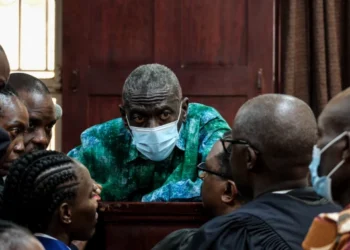The United States has finalized a new agreement with Rwanda to deport up to 250 migrants to the East African nation, part of President Donald Trump’s broader strategy to clamp down on illegal immigration and find alternative destinations for individuals marked for removal.
The deal was signed in Kigali in June between U.S. and Rwandan officials, a Rwandan government source confirmed on condition of anonymity. The official added that Washington had already provided Kigali with an initial list of 10 names for vetting.
Rwandan government spokesperson Yolande Makolo stated that the decision to accept migrants was rooted in the country’s history of displacement and its values of “reintegration and rehabilitation.”
“Rwanda has agreed with the United States to accept up to 250 migrants, in part because nearly every Rwandan family has experienced the hardships of displacement. Under the agreement, Rwanda has the ability to approve each individual proposed for resettlement.”
Yolande Makolo
Those accepted will be supported with “workforce training, healthcare, and accommodation support” to help them integrate and “contribute to one of the fastest-growing economies in the world over the last decade,” Makolo added.
President Donald Trump’s administration has been aggressive in its immigration stance, aiming to deport millions residing in the U.S. illegally. As part of this strategy, officials have ramped up efforts to send deportees to third countries. Earlier this year, Venezuelan nationals accused of gang activity were deported to El Salvador, while similar arrangements have been pursued with countries such as South Sudan and Eswatini.
Agreement Includes Training And Housing
Despite criticism from rights groups over Rwanda’s human rights record, the East African country has steadily positioned itself as a willing partner for Western governments seeking destinations for deported migrants.
In May, Rwanda’s foreign minister confirmed that discussions with Washington on hosting deportees were already underway. The new agreement, sealed in Kigali, now solidifies Rwanda’s role in U.S. immigration enforcement policy.
According to the Rwandan official, the United States will provide Kigali with a grant to support the program, though the exact amount was not disclosed. The agreement allows for the cap of 250 migrants to be increased upon mutual agreement. Moreover, individuals deported under the arrangement will not be required to remain in Rwanda and are free to leave if they choose.
Kigali will only accept deportees with no outstanding criminal cases or those who have completed their sentences. The country will not admit anyone convicted of child sexual abuse, and there is no provision in the deal for serving U.S. sentences within Rwandan borders.
Advocates for tougher immigration laws argue that third-country deportations allow for the swift removal of individuals deemed a public threat, particularly those with criminal records who cannot easily be sent back to their countries of origin.
But critics say such practices are inhumane, placing people in unfamiliar environments where they may face violence, lack of support, or cultural alienation. Legal challenges to these deportations continue, with an ongoing federal lawsuit in Boston challenging the constitutionality of third-country removals. The case could eventually return to the U.S. Supreme Court, which has already ruled in favor of the practice.
Rwanda’s partnership with the U.S. follows a similar, though now-defunct, deal with the United Kingdom. In 2022, Kigali agreed to take in thousands of UK asylum seekers, but the plan was scrapped by Prime Minister Keir Starmer after years of legal hurdles. No individuals were ever relocated under that arrangement.
Beyond migration deals, Rwanda has been a key player in regional diplomacy. Earlier this year, it signed a U.S.-brokered peace accord with the Democratic Republic of Congo to help end conflict in the eastern part of that country. The deal was praised as a hopeful step towards ending a war that has displaced hundreds of thousands in recent months.
While Rwanda’s transformation since the 1994 genocide has been widely lauded, rights groups continue to raise concerns over the country’s internal politics, including allegations of repression and involvement in regional conflicts, accusations Kigali firmly denies.
READ ALSO: IMANI Urges Structured Model For Ghana’s Aid























